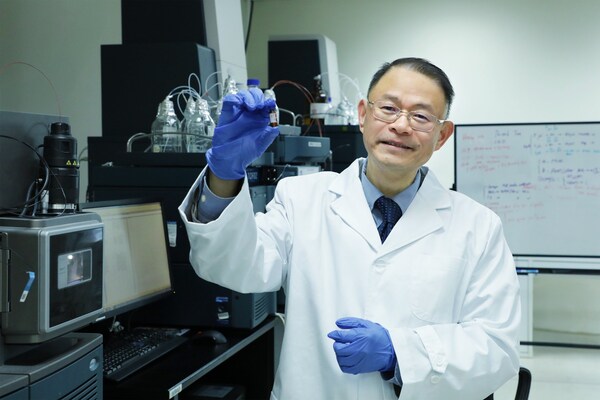HONG KONG, Dec. 23, 2024 /PRNewswire/ -- A research led by Hong Kong Baptist University (HKBU) and the Shanghai Sixth People's Hospital Affiliated to School of Medicine at Shanghai Jiao Tong University (Shanghai Sixth People's Hospital) has discovered that an aptamer developed by HKBU can be used to treat X-linked hypophosphatemia (XLH), a rare bone disease. The aptamer, originally developed to treat osteogenesis imperfecta, has been granted Orphan Drug Designation and Pediatric Rare Disease Designation by the U.S. Food and Drug Administration (FDA).

Professor Zhang Ge, Associate Dean (Research) of Chinese Medicine and Director of the Law Sau Fai Institute for Advancing Translational Medicine in Bone and Joint Diseases at HKBU, in collaboration with other institutions, has developed an aptamer for the treatment of X-linked hypophosphatemia, which has been granted Orphan Drug Designation and Pediatric Rare Disease Designation by the U.S. FDA.
XLH ("X" denotes X-chromosome, a sex-determining chromosome) is a rare bone disease characterised by hypophosphatemia (i.e., low phosphate in blood). It is caused by a mutation in the phosphate regulating endopeptidase homolog X-linked (PHEX) gene, and its inheritance pattern follows an X-linked dominant mode. The bone tissue of XLH patients cannot mineralise properly, thereby affecting the hardness of the bones. The cartilage between the ribs of children with XLH grows and connects like beads strung together. They also result in limb deformities and growth retardation. Adult patients experience symptoms such as osteomalacia, bone pain, changes in body shape, shorter stature and pseudo-fractures, leading to reduced mobility or even disability.
Professor Zhang Ge, Associate Dean (Research) of Chinese Medicine and Director of the Law Sau Fai Institute for Advancing Translational Medicine in Bone and Joint Diseases at HKBU, and Professor Zhang Zhenlin, Director of Osteoporosis and Bone Diseases of the Shanghai Sixth People's Hospital, along with Aptacure Therapeutics Ltd., have developed a long-acting sclerostin-loop3 oligonucleotide aptamer for the treatment of XLH. This aptamer has been granted Orphan Drug Designation and Pediatric Rare Disease Designation by the U.S. FDA for treatment of XLH earlier this year.
Researchers conducted serum tests on 51 patients with XLH from the Shanghai Sixth People's Hospital. The results showed that their serum sclerostin levels were approximately 4.5 times higher than those of healthy individuals of the same age and gender.
Sclerostin is a protein that inhibits bone growth while playing a protective role in the cardiovascular system. Genetic evidence shows that sclerostin deficiency significantly elevates serum phosphorus levels and increases bone mass in mice. However, the monoclonal sclerostin antibody currently used increases the risk of heart attacks, stroke and cardiovascular diseases.
The research team discovered that sclerostin inhibits bone formation and protects the cardiovascular system through different domains of the protein. When sclerostin loses the "loop3 domain", bone mass and strength increase, but its cardiovascular protective effect remains unaffected. The "loop3 domain" of sclerostin can therefore serve as a therapeutic molecular target to promote bone formation, with no safety concern in the cardiovascular system.
The researchers then screen out oligonucleotide aptamers Apc001 that can inhibit the sclerostin loop3. Animal experiments showed that Apc001 can promote bone formation without increasing cardiovascular risk. It can also significantly increase the blood phosphorus levels of mice with XLH. This is expected to provide a drug candidate for the precise treatment of XLH patients.
According to the regulations of the U.S. FDA, once a drug under development obtains Orphan Drug Designation, its subsequent research and development may allow for a reduction in the number of clinical trial samples, be exempt from new drug marketing authorisation fees, and enjoy seven years of market exclusivity. Pediatric Rare Disease Designation allows drugs to be reviewed with priority. Having been designated as both an orphan drug and a pediatric rare disease by the U.S. FDA, Apc001 can accelerate its clinical translation and is expected to benefit patients with XLH sooner.
Currently, the pilot scale production of Apc001 has been completed and is undergoing the preclinical toxicological assessment by a third party. Apc001 is scheduled to enter clinical trials in both Mainland China and the U.S.
source: Hong Kong Baptist University
《說說心理話》情緒反覆無常點算?一句「唔緊要」已經很大安慰!社工分享如何扭轉負面想法► 即睇






























